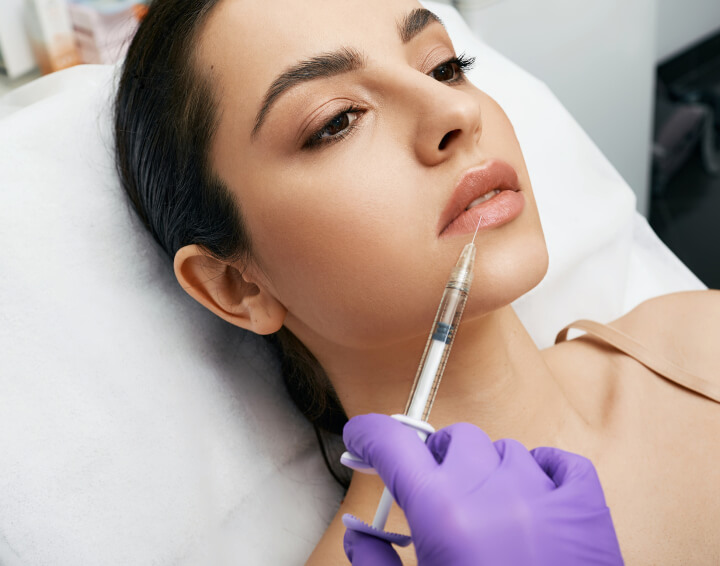
Dermal fillers have been around for years and as a convenient and minimally invasive treatment for wrinkles and facial rejuvenation, it looks like the demand for these injectables will not go away anytime soon. But along with its unmatched popularity, it’s normal for interested patients to have questions about its safety of use, especially for those who have autoimmune diseases.
So are fillers a risk factor for autoimmune reactions? There have been no reported instances where it triggers an autoimmune response. To ensure the safety and effectiveness of the filler injection, you should always make sure to disclose your medical history so that your aesthetic practitioner will know whether or not you’re fit for a dermal filler treatment.
Learn More: Can My Upper Lip Get Swollen After Bellafill Filler and PRP Injection?
Aesthetica can assist you with all your beauty needs, helping you achieve your maximum beauty and aesthetic potential. Call or contact us today to learn more about our cosmetic services.
Studies show that cosmetic dermal fillers are safe and no clear link has been established on whether an autoimmune disease like rheumatoid arthritis or scleroderma can cause a flare-up of serious complications or autoimmune reactions.
An autoimmune reaction is defined as the body’s natural response to any external factors such as a virus or an infection. It’s your bodily defense against anything that the body deems dangerous and sometimes the immune system can mistake your healthy cells and tissues as foreign which results in an autoimmune disease like thyroid disease, rheumatoid arthritis, and inflammatory bowel disease.
Injectable fillers are basically considered foreign objects since they’re clear and soft gel-like materials that are placed underneath your skin. Most side effects from the cosmetic procedure are usually a result of the trauma from the injection so some level of inflammation is normal as the skin heals. However, it’s possible that a patient may experience some late-onset reactions which may show after the first two weeks of the injection.
These delayed complications are very rare but some doctors believe that an autoimmune response can be a cause for hypersensitivity reactions or lumps and nodules formation. This can occur in patients who may have allergies to the filler material being used, causing hyperactivity in their immune system.
It’s safe to say that having an autoimmune disease isn’t a contraindication to getting cosmetic fillers but there are several reminders you need to know before getting the treatment:
Read More: Which Filler Should You Get To Avoid the Tyndall Effect?
The most common types of dermal fillers used in filling in facial wrinkles, frown lines, and lip augmentation are collagen, hyaluronic acid, and poly-L-lactic acid. Each filler material has its unique characteristics and they can incite different reactions when used in individuals. It’s also important to understand what they’re exactly made of and the different side effects that can occur:
Collagen is a natural substance found in the dermis and it’s an essential structural support that gives the skin its elasticity, firmness, and hydration. Injectable collagen fillers help restore your skin’s smooth and soft texture and correct wrinkles and fine lines. It also replenishes your collagen production to make your skin healthy again.
Most collagen-based fillers today like Bellafill are made of bovine collagen, which is a protein sourced from cows. It’s mixed with PMMA microspheres to allow it to stay in place when injected and it’s recognized by the body as the structure where your natural collagen will form.
Bovine collagen can create an immune response and there is a possibility that it may cause lumps or granuloma reactions in some patients. Hypersensitivity reactions may also happen in other collagen-based fillers like Zyplast or Zyderm. Getting a skin test is beneficial to determine whether you are allergic to bovine collagen.
Hyaluronic acid-based fillers are the most popular type of cosmetic injectables today. There is a wide range of cosmetic HA filler products like Restylane, Juvederm, and Belotero. Like collagen, hyaluronic acid is a naturally occurring substance in the body and it’s what binds water to skin cells to maintain hydration and moisture.
HA-based fillers are excellent at addressing age-related facial volume loss and eliminating wrinkles, fine lines, nasolabial folds, and lip lines. Hyaluronic acid fillers are generally safe and are less likely to cause allergic reactions and inflammatory responses. However, rare late-onset hypersensitivity reactions like hardness or bumps and swelling may develop in months after the injection.
Thankfully, these reactions can be easily reversed with hyaluronidase injections. Hyaluronidase is an enzyme that can help the breakdown of the injected HA filler to stop the reaction from getting too severe.
Poly-L-lactic acid fillers like Sculptra are made of biocompatible synthetic substances which is the same material that’s used for dissolvable medical stitches. This absorbable soft tissue filler is safe to use in the body and they’re known to be good collagen stimulators.
PLLA biodegradable fillers provide subtle enhancements when initially injected into the skin but their results get better with time as its material encourages your body to rebuild its own collagen. These types of filler material are great at addressing deeper lines and bringing back structure to your skin to improve sagging issues.
Late-onset formation of skin nodules, granulomas, lumps, and some inflammatory reactions are rare complications that may occur with PLLA fillers. These complications have only been reported in HIV-infected individuals and have been said to occur within 3 to 4 months from the treatment.
Read More: How Long Do You Have to Keep Your Head Upright After Botox and Fillers?
One thing that people love about dermal fillers is how it doesn’t require any downtime after the procedure. Unlike plastic surgery, it’s a non-invasive treatment so its side effects are minimal and can be easily managed. Here are the common post-injection reactions and how you can treat them:
Although getting the fillers are virtually painless, you may experience pain at the injection site after the procedure. It’s a normal bodily reaction after being injected with the filler substance and the good thing is that it can only last for several hours. Applying an ice pack or cold compress over the treated area can help manage the pain.
Mild swelling and bruising are also common reactions to receiving dermal filler treatments. This is a natural temporary response to the filler material injected and will gradually subside on its own once the substance sets in and the body gets used to the filler. Meanwhile, temporary bruising happens when a small amount of blood leaks into the skin but they’re always manageable and not a cause for concern.
The use of a cold compress after the injections can help reduce swelling and bruising in the treatment area. You may also treat it with Arnica gel, aloe vera, or vitamin K creams to reduce the severity of the reactions.
Some level of skin discoloration or redness is also common after dermal fillers. This can appear together with the inflammation of the skin after the facial filler administration. You can cover up redness in the treated site with makeup but only apply it after a few hours have passed from the procedure. Topical vitamin K creams and corticosteroid medications may also help in managing persistent redness.
Facial fillers should always be administered by an experienced cosmetic surgeon. This way, you’ll be reducing the risk of dermal filler complications and ensuring that you get the best results from the treatment. Here are other reminders to avoid adverse effects from dermal filler injections:

There is only one way to assure that you get safe and effective cosmetic filler treatments and that is to choose the right clinic to get a highly skilled injector. You can trust that our practitioners and staff at Aesthetica are experts in dermal filler treatments, performing with care and accuracy to avoid any adverse reactions.
Our specialists can make you a customized plan to get the best results possible to address your specific beauty concerns and needs. Explore your dermal filler options by contacting us or book an appointment with us to start your beauty journey today.
Aesthetica can assist you with all your beauty needs, helping you achieve your maximum beauty and aesthetic potential. Call or contact us today to learn more about our cosmetic services.